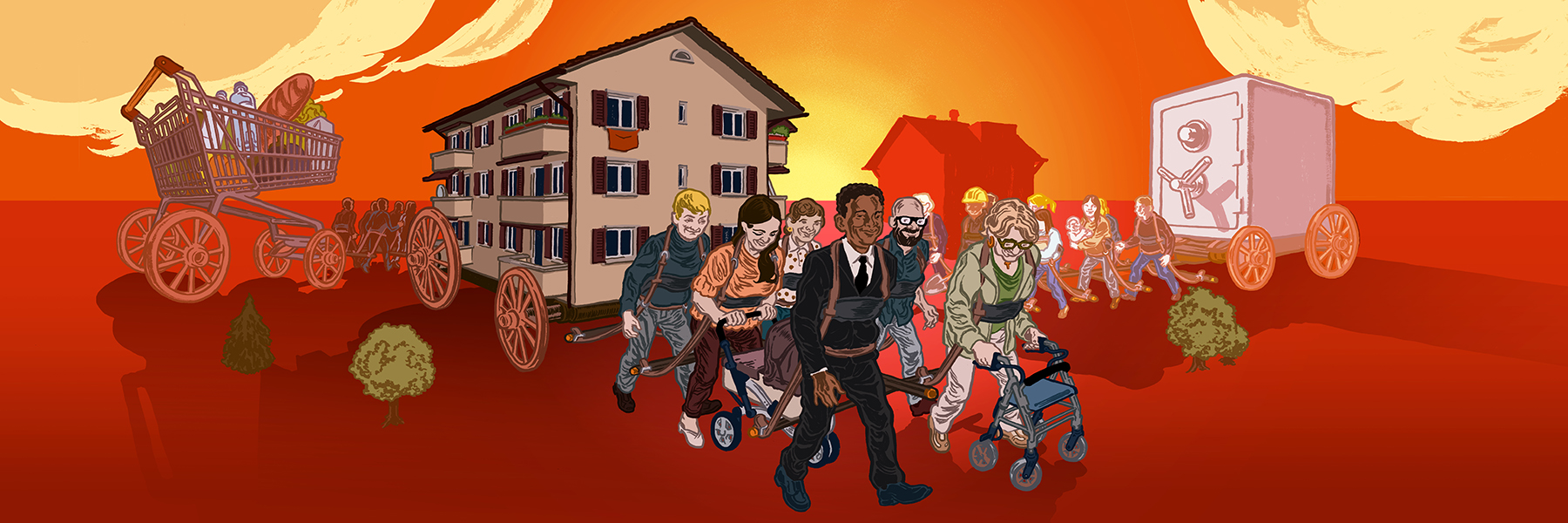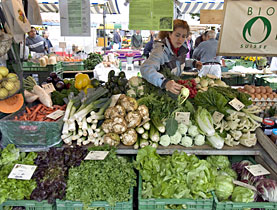
Contract farming co-ops show organic growth

An increasing number of Swiss-French homes are having fresh organic fruit and vegetables grown by local contract farming cooperatives delivered to their doorsteps.
One of the pioneers in this specialist field in the Geneva region – the Jardins de Cocagne cooperative – is this Saturday celebrating its 30th anniversary.
Founded in 1978 by local consumers, the Geneva collective now boasts 400 family members, or 1,000 people in total, who each week or month receive a shopping bag packed with the organic produce it grows southwest of the city.
But the co-op’s reputation is such that one hundred people are on the waiting list, said Claude Mudry, one of the five main people in charge of Jardins de Cocagne.
“There’s a really big demand right now. For a long time we increased via word-of-mouth by around ten people a year, but now it’s impressive; we get new requests every day,” he told swissinfo.
Local contract farming cooperatives are thought to have originated in Japan in the 1960s, and later became popular in the United States, France and in various developing countries. Although the concept has been around for 30-odd years in Switzerland, it started to take off from 2000.
The reasons why people are turning away from supermarkets in favour of local cooperatives are numerous. Many want a better idea of what they are eating, where it’s from and how it’s produced.
Other reasons are an interest in food safety and wanting to support local agriculture.
Eat local
“I think it’s really important to learn to feed yourself with seasonal vegetables,” said Jérôme Chablais, a geology PhD student from Geneva, who joined the co-op three years ago.
“I think people are more aware about food safety issues and are fed up eating any old rubbish. If you do a simple calculation of how much it costs to eat organic food from either Migros or Coop supermarkets, it’s quite expensive and the quality is quite poor. If you do an annual calculation here, we are definite winners.”
Fellow member Stephanie Jüstrich agreed that the concept seemed to be taking off locally.
“We have lots of friends who receive Cocagne vegetables or those from other cooperatives. And more and more people seem interested. Lots of similar associations have sprung up in a short period of time,” she added.
“I wanted to eat products grown near where I live. It’s totally absurd to transport products from one side of Switzerland or Europe to the other,” said Chantal, a member of Jardins du Flon, a Lausanne-based cooperative that started in 2007.
Downsides
Yet the projects have their downsides, such as the payment method – generally an annual fee in advance – the relatively rigid delivery times and unpleasant surprises of receiving fennel when what you really wanted for dinner were courgettes.
“It’s a niche which helps raise awareness and encourages people to eat Swiss produce,” said Nicolas Berthold, spokesperson for the Swiss Market Garden Union. “But you have to be very motivated, given the constraints in the contract.”
But the unknown content of the packages forces you to discover more exotic produce like Jerusalem artichokes or Nashi pears, explained Chantal.
“I am not a big fan of parsnips or turnips, but the concept forces you to vary your diet a little bit,” she said.
The members may be asked to get their hands dirty, too. At Jardins de Cocagne everyone has to work four half-days a year, planting, digging or filling shopping bags.
But this social contact is also very important, said Mudry.
“We are part of a small structure where you meet other people with similar aims: we want to eat quality produce, work the land, have correct salaries, etc. People are quite committed and I think that’s important,” he said.
Swiss-German regions
In French-speaking Switzerland, some 3,400 households regularly receive shopping baskets from one of the 20 cooperatives, of which seven are based in canton Geneva and five in canton Vaud.
But strangely the concept has not taken root in German-speaking regions.
Currently there is only one scheme in Basel, launched in 1980. According to the Federal Agriculture Office, numerous farms offer subscription schemes to receive fruit and vegetables, but without involving a contract between the producer and consumer.
The Swiss Germans seem to be more oriented towards regional traditions more than principles like food sovereignty, said Gerhard Hasinger, from the Notre Panier Bio ooperative at Pringy in canton Fribourg.
swissinfo, Simon Bradley in Geneva
Local contract farming cooperatives are thought to have originated in Japan in the 1960s, and later became popular in the United States, France and certain developing countries. Although the concept has been around for 30-odd years in Switzerland, it started to take off from 2000.
In French-speaking Switzerland, some 3,400 households regularly receive shopping baskets from one of the 20 cooperatives, of which seven are based in canton Geneva and five in canton Vaud. In Swiss-German regions there is one project in Basel.
Under a typical contract-farming scheme, the consumer draws up an agreement with a farmer or group of local farmers to produce the food they need. The farmer commits to growing produce according to the wishes of the consumers in exchange for a guaranteed amount every month. The quality, quantity and date of delivery, together with the price are all fixed in advance.
Depending on the co-op structure, members receive a shopping bag or box with a mixture of fruit, vegetables, cereals, milk products, meat, or even wine and olive oil.

In compliance with the JTI standards
More: SWI swissinfo.ch certified by the Journalism Trust Initiative





































You can find an overview of ongoing debates with our journalists here . Please join us!
If you want to start a conversation about a topic raised in this article or want to report factual errors, email us at english@swissinfo.ch.